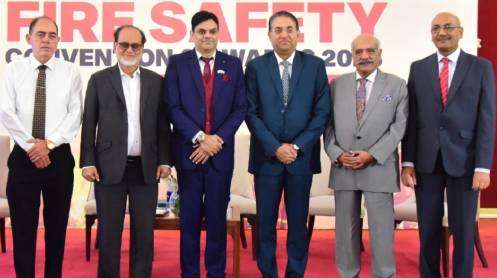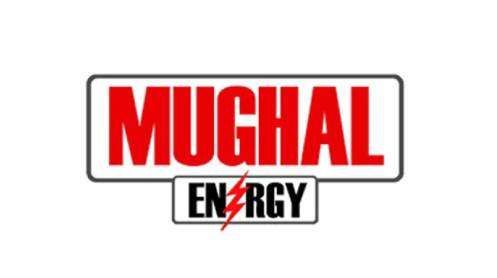Builders, business leaders unite to boycott shops violating fire safety laws in Karachi
Karachi Leading representatives of Karachi’s builders, businessmen, and industrialists have called for a social boycott of retail outlets operating illegally in residential buildings, in defiance of building and fire safety regulations.
The joint call came during a panel discussion held as part of the 15th Annual Fire Safety & Security Convention 2025, organised by the National Forum for Environment & Health (NFEH) at a local hotel. The session featured leaders from the Association of Builders and Developers of Pakistan (ABAD) and the representative bodies of the city’s two largest industrial zones.
Earlier, in his address as chief guest of the convention’s inaugural session, Rehan Hanif, President of the Karachi Chamber of Commerce & Industry (KCCI), announced that the chamber had recently issued fire prevention guidelines—now available on its website—for the safety of businesses and industries in the city.
He remarked that Karachi, being Pakistan’s most industrialised and economically vital city, should set a national example by enforcing the strictest fire safety and emergency response systems across its factories, commercial centres, and high-rises.
He urged all stakeholders—government agencies, civic bodies, and industrial associations—to collaborate through public-private partnerships to enhance the city’s emergency response capabilities.
Speaking on behalf of ABAD, Senior Vice-Chairman Syed Afzal Hameed said he would “not hesitate to condemn even fellow builders” found guilty of converting residential buildings into commercial establishments without proper fire safety arrangements.
He stressed that a social boycott of such retail centres and commercial units, which endangered the lives of citizens, was the most effective way to eliminate unsafe practices.
Hameed urged the authorities to take strict punitive action against the unauthorised commercial use of residential premises and invited citizens to report violations directly to ABAD for further action.
He also underscored the need to enforce the Sindh Condominium Act, 2014, proposing that licensed professional maintenance agencies—not untrained residents’ unions—should oversee the upkeep of multi-storey residential buildings. Such agencies, he said, could ensure the availability of alternative exits and fully functional fire safety mechanisms to prevent tragedies.
Ahmed Azeem Alvi, President of the SITE Association of Industry, urged the government to include emergency preparedness and disaster management in school curricula so that children grow up with an understanding of fire safety and risk prevention at homes, markets, and workplaces.
He noted that the SITE Association had already taken key steps, including establishing trained response teams and equipping factories with fire tenders and other emergency resources to protect hundreds of industrial units in the SITE area.
Muhammad Ikram Rajput, President of the Korangi Association of Trade & Industry (KATI), pledged full cooperation with relevant authorities to organise fire safety and emergency response training sessions for industrial workers and ensure proper fire protection standards across KATI’s member industries.
Dr. Imran Taj, President of the Fire Protection Industry of Pakistan, revealed plans to establish a dedicated training academy on the National Highway in Karachi to train emergency and rescue staff in line with international disaster response standards. He also emphasised the strict enforcement of the Building Code of Pakistan, particularly for high-rise construction projects.
He said that FPIP and the National Forum for Environment and Health will soon organize a Safety Week in Karachi, which will include participation from commercial, industrial, and business organizations, as well as civil society and other institutions. The purpose of the event is to raise awareness.
NFEH President Muhammad Naeem Qureshi highlighted that the Fire Safety & Security Convention had been held annually for the past 14 years, serving as a vital platform for dialogue among builders, industrialists, regulators, and safety experts to promote a robust fire safety culture in Pakistan’s urban and industrial sectors.
Renowned fire safety expert Saeed Jadoon called upon all municipal, civic, and land-owning authorities—including the Karachi Metropolitan Corporation (KMC), cantonment boards, and the DHA—to work in unison to ensure fire safety compliance across all categories of buildings in the metropolis.
Ruqiya Naeem, NFEH General-Secretary, stressed that retail stores must not be allowed on the ground floors of residential high-rises unless equipped with proper emergency exits and firefighting measures.
NFEH Vice-President Nadeem Ashraf urged industries to upgrade their fire and emergency systems to meet international standards, noting that compliance with such protocols could help Pakistani manufacturers gain access to export markets in developed countries.
On this occasion M. Aamir Nadeem, Lead HSE Trainer & Consultant, Anas Hammad, General Manager Safety, Gas & Oil Pakistan, Prof. Dr. Muhammad Mohsin Aman, Director ASURE Centre, Department of Electrical Engineering NED University Of Engineering And Technology, Tariq Ali Nizamani, Managing Director, Sindh Solid Waste Management Board and others also spoke.







